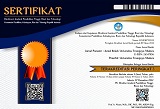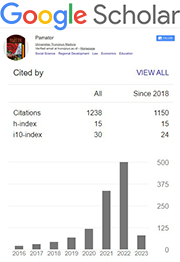Outcome-Based Education Scoring System Utilizing Modular Object-Oriented Dynamic Learning Environment
Abstract
The dynamic nature of education necessitates inventive approaches to assessment and evaluation. This study concentrates on formulating a Scoring System aligned with Outcome-Based Education (OBE) principles, utilizing the Modular Object-Oriented Dynamic Learning Environment (MOODLE) platform. OBE prioritizes showcasing specific learning outcomes, cultivating a student-centric approach. The proposed system seeks to improve assessments through a flexible framework accommodating diverse learning objectives, employing a modular and object-oriented design. Integration with MOODLE, a widely-used e-learning platform, explores seamless implementation and user-friendly interaction. The Scoring System aids educators in efficiently evaluating student performance against predefined outcomes, fostering transparency and accountability.Key features include customizable assessments, progress tracking, and timely feedback. The study also examines the system's impact on student engagement, motivation, and overall learning outcomes, contributing valuable insights to innovative assessment methodologies in contemporary education. In conclusion, the research introduces a Scoring System harmonizing OBE principles with MOODLE's flexibility, benefiting educators, students, and institutions. The study's outcomes provide valuable implications for educators and technologists aiming to enhance assessments in the evolving education landscape.
Keywords
Full Text:
PDFReferences
Taherdoost H, Madanchian M. ScienceDirect ScienceDirect Employment of Technological-Based Approaches for Creative E- Learning ; Teaching Management Information Systems. Procedia Comput Sci [Internet]. 2022;215:802–8. Available from: https://doi.org/10.1016/j.procs.2022.12.082
Mehrolia S, Alagarsamy S, Sabari MI. Heliyon Moderating effects of academic involvement in web-based learning management system success : A multigroup analysis. Heliyon [Internet]. 2021;7(August 2020):e07000. Available from: https://doi.org/10.1016/j.heliyon.2021.e07000
Diniz A. Computers & Education Computer-based concept mapping combined with learning management system use : An explorative study under the self- and collaborative-mode. 2017;107:127–46.
Cantabella M, Martínez-españa R, Ayuso B, Yáñez JA. Analysis of student behavior in learning management systems through a Big Data framework. Futur Gener Comput Syst [Internet]. 2019;90:262–72. Available from: https://doi.org/10.1016/j.future.2018.08.003
Buckley K, Fairman K, Pogge E, Raney E. Use of Learning Management System Data to Predict Student Success in a Pharmacy Capstone Course. Am J Pharm Educ [Internet]. 2022;86(4):8594. Available from: https://doi.org/10.5688/ajpe8594
Raheem SA, Ibrahim AA. Optik Effects of CLEM cloud based E-learning management system for teaching and learning process in mechatronics. Optik (Stuttg) [Internet]. 2022;271(August):170048. Available from: https://doi.org/10.1016/j.ijleo.2022.170048
Al-mamary YHS. International Journal of Information Management Data Insights Why do students adopt and use Learning Management Systems ?: Insights from Saudi Arabia. Int J Inf Manag Data Insights [Internet]. 2022;2(2):100088. Available from: https://doi.org/10.1016/j.jjimei.2022.100088
Dahalan HM, Maznah R, Hussain R. Development of Web-Based Assessment in Teaching and Learning Management System ( e-ATLMS ). 2010;9:244–8. Available from: http://dx.doi.org/10.1016/j.sbspro.2010.12.144
Iqbal N, Ur S, Elrehail H, Fahed T, Masaeid A, Adaileh R, et al. International Journal of Information Analyzing effect of fear and uncertainty avoidance on use behavior of learning management system : Post COVID-19 era. Int J Inf Manag Data Insights [Internet]. 2023;3(2):100197. Available from: https://doi.org/10.1016/j.jjimei.2023.100197
Cheng M, Hoi A, Yuen K. Computers & Education Student continuance of learning management system use : A longitudinal exploration. Comput Educ [Internet]. 2018;120(June 2017):241–53. Available from: https://doi.org/10.1016/j.compedu.2018.02.004
Cheng M, Tao D, Xie S, Cao X, Hk A. Computers in Human Behavior Exploring students ’ learning management system acceptance patterns : Antecedents and consequences of profile membership. Comput Human Behav [Internet]. 2022;135(June):107374. Available from: https://doi.org/10.1016/j.chb.2022.107374
Conde MA, García F, Rodríguez-conde MJ, Alier M, García-holgado A. Computers in Human Behavior Perceived openness of Learning Management Systems by students and teachers in education and technology courses. 2014;31:517–26.
Nguyen N. Asia Paci fi c Management Review A study on satisfaction of users towards learning management system at International University e Vietnam National University HCMC. Asia Pacific Manag Rev [Internet]. 2021;26(4):186–96. Available from: https://doi.org/10.1016/j.apmrv.2021.02.001
Schoonenboom J. Computers & Education Using an adapted , task-level technology acceptance model to explain why instructors in higher education intend to use some learning management system tools more than others. Comput Educ [Internet]. 2014;71:247–56. Available from: http://dx.doi.org/10.1016/j.compedu.2013.09.016
Bezverhny E, Dadteev K, Barykin L, Nemeshaev S, Bezverhny E, Dadteev K, et al. ScienceDirect ScienceDirect Use of chat bots in Learning Management Systems Use of chat bots in Learning Management Systems. Procedia Comput Sci [Internet]. 2020;169(2019):652–5. Available from: https://doi.org/10.1016/j.procs.2020.02.195
Han I, Sug W. Computers & Education The use of a mobile learning management system and academic achievement of online students. Comput Educ [Internet]. 2016;102:79–89. Available from: http://dx.doi.org/10.1016/j.compedu.2016.07.003
Priss U. ScienceDirect A Preliminary Preliminary Semiotic-Conceptual Semiotic-Conceptual Analysis Analysis of of a a Learning Learning Management Management System System. Procedia Comput Sci [Internet]. 2020;176:3702–9. Available from: https://doi.org/10.1016/j.procs.2020.09.017
Alfalah AA. International Journal of Information Management Data Insights Factors influencing students ’ adoption and use of mobile learning management systems ( m-LMSs ): A quantitative study of Saudi Arabia. Int J Inf Manag Data Insights [Internet]. 2023;3(1):100143. Available from: https://doi.org/10.1016/j.jjimei.2022.100143
Lwande C, Muchemi L, Oboko R. Heliyon Identifying learning styles and cognitive traits in a learning management system. Heliyon [Internet]. 2021;7(November 2019):e07701. Available from: https://doi.org/10.1016/j.heliyon.2021.e07701
Ramírez-correa PE, Rondan-cataluña FJ, Arenas-gaitán J, Alfaro-perez JL. Telematics and Informatics Moderating effect of learning styles on a learning management system ’ s success. 2017;34:272–86.
Thepwongsa I, Sripa P, Muthukumar R. Heliyon The effects of a newly established online learning management system : the perspectives of Thai medical students in a public medical school. Heliyon [Internet]. 2021;7(October):e08182. Available from: https://doi.org/10.1016/j.heliyon.2021.e08182
Tan TK, Samavedham L. The learning process matter : A sequence analysis perspective of examining procrastination using learning management system ☆. Comput Educ Open [Internet]. 2022;3(August 2021):100112. Available from: https://doi.org/10.1016/j.caeo.2022.100112
York EJ. Digital surveillance in online writing instruction : Panopticism and simulation in learning management systems. Comput Compos [Internet]. 2021;62:102680. Available from: https://doi.org/10.1016/j.compcom.2021.102680
Pavlenko D, Barykin L, Nemeshaev S, Bezverhny E, Pavlenko D, Barykin L, et al. ScienceDirect ScienceDirect Individual approach to knowledge control in learning management Individual approach to knowledge control in learning management system system. Procedia Comput Sci [Internet]. 2020;169(2019):259–63. Available from: https://doi.org/10.1016/j.procs.2020.02.162
Lebeaux D, Jablon E, Flahault C, Lanternier F, Viard J, Pacé B, et al. Introducing an Open-Source Course Management System ( Moodle ) for Blended learning on infectious diseases and microbiology : A pre-post observational study. 2021;51:477–83.
Alferidi A, Alsolami M, Lami B, Ben S. Design and implementation of an indoor environment management system using a deep reinforcement learning approach. Ain Shams Eng J [Internet]. 2023;14(11):102534. Available from: https://doi.org/10.1016/j.asej.2023.102534
DOI: https://doi.org/10.21107/pamator.v16i4.23726
Refbacks
- There are currently no refbacks.
Copyright (c) 2023 Ana Tsalitsatun Ni'mah, Firdaus Solihin, Ita Uliyah Sari

This work is licensed under a Creative Commons Attribution-ShareAlike 4.0 International License.
Jurnal Pamator : Jurnal Ilmiah Universitas Trunojoyo by Universitas Trunojoyo Madura is licensed under a Creative Commons Attribution-ShareAlike 4.0 International License.















.png)